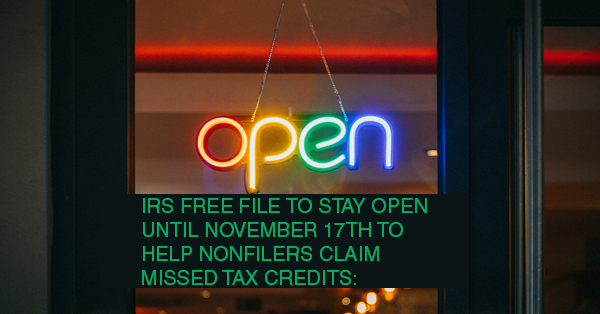IRS FREE FILE TO STAY OPEN UNTIL NOVEMBER 17TH TO HELP NONFILERS CLAIM MISSED TAX CREDITS:

The IRS is sending letters to more than 9 million individuals and families who appear to qualify for a variety of key tax benefits but did not claim them by filing a 2021 federal income tax return. Many in this group may be eligible to claim some or all of the 2021 Recovery Rebate Credit, the Child Tax Credit, the Earned Income Tax Credit, and other tax credits depending on their personal and family situation. The special reminder letters, which will be arriving in mailboxes over the next few weeks, are being sent to people who appear to qualify for the Child Tax Credit, Recovery Rebate Credit (RRC) or Earned Income Tax Credit (EITC) but haven’t yet filed a 2021 return to claim them. The letter, printed in both English and Spanish, provides a brief overview of each of these three credits. The yet-to-be-collected tax breaks are COVID-19 economic impact payments available as the Recovery Rebate Credit (RRC), the Child Tax Credit (CTC), and the Earned Income Tax Credit (EITC). These tax benefits were created or enhanced under the American Rescue Plan Act of 2021, and their amounts could make a substantial difference to qualifying recipients, as they were enhanced for the 2021 tax year.
Treasury's Office of Tax Analysis identified the letter recipients, who appear to be people who did not make enough money to require they file a Form 1040, by matching up available tax information the IRS receives. This data typically is information from W-2 forms, 1099s, and other third-party statements that routinely are copied to the IRS.
The no-cost tax preparation and e-filing service can be used by filers whose incomes are $73,000 or less and now have this extended November 17 ‘Free File’ operational date, a month after the usual October 17 extended filing deadline.
The key reason behind the IRS urgency to get the tax breaks distributed to all who qualify is their special 2021 amounts, which were enhanced to help individuals and families deal with financial problems created by the coronavirus pandemic. Those tax breaks include:
- The Child Tax Credit can be as much as $3,600 per child age 5 or younger. It's worth $3,000 per youngster age 6 to 17. This increase amount is available only on 2021 tax returns. The amount for the 2022 tax year has returned to $2,000 per qualifying child.
- The 2021 tax year Earned Income Tax Credit (EITC) also is more generous — as much as $1,502 — for eligible workers who have no children. The EITC also is worth $3,618 for families with one child; $5,980 for those with two children; and $6,728 for those with at least three children. Additional temporary legislative changes also mean more may qualify for the EITC.
- The third round of the Recovery Rebate Credit (RRC), aka the COVID stimulus money, was distributed last year to qualifying taxpayers who had filed tax returns in prior years. Those who missed out on those economic impact payments, or who got less than the maximum — that's $1,400 for each qualifying adult, plus $1,400 for each eligible child or adult dependent — should look into claiming the RRC.
- The Child and Dependent Care Credit helps eligible families pay for daycare so that parents can work. For 2021, it's worth up to $4,000 for one qualifying person, and $8,000 for two or more qualifying persons.
No effect on other benefits: In announcing the special 2021 tax break letters and later Free File availability, IRS Commissioner Chuck Rettig emphasized the value, especially for families, of the unclaimed tax breaks.
"We encourage people who haven't filed a tax return yet for 2021 to review these options," said Rettig. "Even if they aren't required to file a tax return, they may still qualify for several important credits. We don't want people to overlook these tax credits, and the letters will remind people of their potential eligibility and steps they can take."
The IRS also notes that claiming these credits will not affect an individual's ability to claim other federal benefits for which they might qualify. The unaffected benefits include Supplemental Security Income (SSI), Supplemental Nutrition Assistance Program (SNAP), Temporary Assistance for Needy Families (TANF), and the Special Supplemental Nutrition Program for Women, Infants, and Children (WIC).
Claiming these credits also has no effect on an individual's immigration status or ability to get a green card or immigration benefits.




